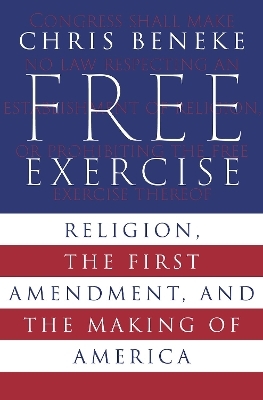
Free Exercise
Religion, the First Amendment, and the Making of America
Seiten
2024
Oxford University Press Inc (Verlag)
978-0-19-776702-3 (ISBN)
Oxford University Press Inc (Verlag)
978-0-19-776702-3 (ISBN)
- Lieferbar (Termin unbekannt)
- Versandkostenfrei innerhalb Deutschlands
- Auch auf Rechnung
- Verfügbarkeit in der Filiale vor Ort prüfen
- Artikel merken
Free Exercise is an innovative contribution to both United States constitutional history and the history of religious toleration in the United States. It traces the routes by which Americans arrived at the First Amendment's religious clauses, the cultural currents that shaped their meaning, and the consequences that flowed from them.
CONGRESS SHALL MAKE NO LAW RESPECTING AN ESTABLISHMENT OF RELIGION, OR PROHIBITING THE FREE EXERCISE THEREOF. Those words, scratched on parchment in 1789, open the U.S. Constitution's First Amendment. From them, countless interpretations have been drawn. As a consequence, an astonishing variety of activities in modern America-prayer after football games, Bible reading in classrooms, company healthcare policies, the baking of wedding cakes, and Ten Commandment displays around courthouses-have been alternately authorized, prohibited, or modified.
In this compelling historical account, Chris Beneke explains how the religion clauses came into existence and how they were woven into American culture. He brings prominent early national figures to life, including George Washington, James Madison, and Thomas Paine, while chronicling the First Amendment's relationship to defining social conditions like slavery, civility, family life, and the free market. Beneke probes what kind of nation America was when the religion clauses were framed and what kind of nation it was becoming.
Going beyond traditional church-state scholarship, Beneke also demonstrates how white women, African Americans, Roman Catholics, Jews, and nonbelievers widened religious liberty's application and illuminated its boundaries. In doing so he makes a groundbreaking contribution to both constitutional history and the history of American pluralism.
CONGRESS SHALL MAKE NO LAW RESPECTING AN ESTABLISHMENT OF RELIGION, OR PROHIBITING THE FREE EXERCISE THEREOF. Those words, scratched on parchment in 1789, open the U.S. Constitution's First Amendment. From them, countless interpretations have been drawn. As a consequence, an astonishing variety of activities in modern America-prayer after football games, Bible reading in classrooms, company healthcare policies, the baking of wedding cakes, and Ten Commandment displays around courthouses-have been alternately authorized, prohibited, or modified.
In this compelling historical account, Chris Beneke explains how the religion clauses came into existence and how they were woven into American culture. He brings prominent early national figures to life, including George Washington, James Madison, and Thomas Paine, while chronicling the First Amendment's relationship to defining social conditions like slavery, civility, family life, and the free market. Beneke probes what kind of nation America was when the religion clauses were framed and what kind of nation it was becoming.
Going beyond traditional church-state scholarship, Beneke also demonstrates how white women, African Americans, Roman Catholics, Jews, and nonbelievers widened religious liberty's application and illuminated its boundaries. In doing so he makes a groundbreaking contribution to both constitutional history and the history of American pluralism.
Chris Beneke is professor of History and Associate Dean for the First Year Experience and the Bentley Core at Bentley University. He has written extensively about the history of religious toleration, as well as essays on politics, religion, and sports for The Atlantic, The Chronicle of Higher Education, The New Republic, and The Washington Post.
| Erscheinungsdatum | 26.09.2024 |
|---|---|
| Verlagsort | New York |
| Sprache | englisch |
| Maße | 152 x 226 mm |
| Gewicht | 499 g |
| Themenwelt | Sachbuch/Ratgeber ► Geschichte / Politik ► Regional- / Landesgeschichte |
| Geisteswissenschaften ► Geschichte ► Regional- / Ländergeschichte | |
| Geschichte ► Teilgebiete der Geschichte ► Militärgeschichte | |
| Geschichte ► Teilgebiete der Geschichte ► Religionsgeschichte | |
| Religion / Theologie ► Christentum ► Kirchengeschichte | |
| Recht / Steuern ► Rechtsgeschichte | |
| ISBN-10 | 0-19-776702-8 / 0197767028 |
| ISBN-13 | 978-0-19-776702-3 / 9780197767023 |
| Zustand | Neuware |
| Informationen gemäß Produktsicherheitsverordnung (GPSR) | |
| Haben Sie eine Frage zum Produkt? |
Mehr entdecken
aus dem Bereich
aus dem Bereich
neueste Manipulationstechniken als Waffengattung der NATO
Buch | Softcover (2023)
Westend (Verlag)
24,00 €
Deutschlands Schwäche in der Zeitenwende
Buch | Softcover (2023)
C.H.Beck (Verlag)
18,00 €


